

TOPIK Advanced Level Grammar
TOPIK ADVANCED LEVEL GRAMMAR
~
ㄴ
/
는가
싶다
~ㄴ/는가 싶다 is used to express a supposition (“I think it might……”, “It seems like……”, “I
wonder if……”). It uses the ~ㄴ/는가 form to indicate that it’s a self-directed question. It can
be used interchangeably with ~(으)ㄹ까 싶다, (으)ㄹ 듯싶다.
심한 병인가 싶어서 병원에 갔다 .
I went to the hospital because I thought it might be a serious illness.
너한테 무슨 일이라도 있는가 싶어서 걱정돼 전화했어.
I called because I wondered if something had happened to you so I was worried.
~
게끔
This is a similar to ~게 or ~도록, but the goal in the first clause is slightly more
emphasized. So it can be understood as “In order for _______, do ______.” The first clause
can have either a descriptive or an active verb, but the second clause can only use an
active verb.
음식이 넉넉하 게끔 고기를 더 삽시다.
Let’s buy more meat so that we’ll have enough food.
선생님은 모두다 알아들을 수 있게끔 차근차근 가르쳐주었다.
Our professor explained everything slowly and carefully so that everyone would
understand.
~
기
(
가
)
이를
데
없다
Posted 1 year ago
This is used to express that the state of something is so extraordinary or excessive that
it cannot be conveyed in words. “이를 데” comes from the verb 이르다 (to tell), and can
Page | 2 www.topikguide.com

TOPIK Advanced Level Grammar
be understood as 말할 데. Literally it means “it is so ____ that you can’t describe it.” It is
used only with a descriptive verb.
note: the 가 is often dropped.
큰 배우가 떠나 아쉽기(가) 이를 데 없다.
A famous actor’s death is so sad that it can’t be described.
그는 꼼꼼하기가 이를 데 없는 사람이었어요.
He’s incredibly meticulous.
벚꽃 축제라서 사람들이 너무 많아서 붐비기 이를 데 없다
It was the cherry blossom festival and there were so many people that it was
indescribably crowded.
~
자니
Posted 1 year ago
This is a shortened form of ~자(고 하)니(까), and can be used interchangeably with
~(으)려고 하니(까).
It expresses that the subject has an intention to do something in the first clause, but
then an unexpected result occurs, or something is discovered that obstructs the
subject’s original intention.
전화를 하지니 시간이 너무 늦었어요.
I was about to call her, but then realized it was too late.
알면서 모르는 척하자니 진땀이 다 나요.
I meant to pretend I didn’t know, but I began to sweat profusely.
가만히 기다리고만 있자니, 애가 타서 도저히 못 기다렸다.
I’d intended to just wait, but I got anxious so I couldn’t wait at all anymore.
혼자 빈집을 지키고 있자니 자꾸만 무서운 생각이 난다.
She’s been looking after an empty house by herself, but every once and awhile she
has scary thoughts.
Page | 3 www.topikguide.com

TOPIK Advanced Level Grammar
이것을 버리자니 아깝고, 그냥 두자니 거추장스럽네.
It would be a shame to just throw this away, but it’d be a burden to keep it.
~
ㄴ
/
는가
하면
Posted 1 year ago
This expresses that while something in the first clause is true, something in the second
clause that is related to the first clause but contrary/unexpected is also true. It uses
~ㄴ/는가 from the interrogative form and adds ~하면 (if you) to create an expression
that can be understood as “If you were to ask me if ___ is true, [I’d say that] ___ is [also]
true.” That’s incredibly awkward though, so it’s easier to remember it as “Not only
[clause 1], but also [clause 2]” with two contrary clauses.
This structure is often used with words like “도” and “이제는” to stress the contrast.
eg.) 커피에다가 설탕만 넣는 사람이 있는가 하면 크림만 넣는 사람도 있다.
Not only are there people who only put sugar in their coffee, there are also people
who only use cream. [If you ask me “Are there people who only put sugar in their
coffee?”, there’s actually also people who only use cream.]
그는 배우인가 하면 가수이기도 하다.
He is not only an actor, he is also a singer.
~
ㄹ지언정
Posted 1 year ago
This is described as being similar to ㄹ망정, with the same two meanings. However, this
structure is slightly stronger.
1. The first meaning can be understood as “Even though…” or “Although…”. The first
clause is (usually) a negative thing, and the second clause is a positive thing. You can
think of it as interchangeable with “… 그럼에도 불구하고 …”.
힘들지언정, 불가능하지 않다.
Even though it’s difficult, it’s not impossible.
Page | 4 www.topikguide.com

TOPIK Advanced Level Grammar
2. The second is like saying “I’d rather … than …”.
죽을지언정 실패하지 않는다.
I’d rather die than fail.
For more example sentences, see the ~ㄹ망정 post.
~
ㄴ답시고
Posted 1 year ago
This one was tricky. Thanks to everyone on lang-8 who helped explain this!
The meanings can be separated into two types, but they are both similar. The first
clause in the sentence reports what a person intends to do or says they are going to
do, and the second clause shows the contrasting truth of events. It can be used like
~ㄴ다면서 or ~ㄴ다고 하면서, but the speaker is always disapproving or dissatisfied
about the result in the second clause. It seems kind of sarcastic.
도서관에 간답시고 나가서 놀기만 했다.
He said he was going go to the library, but then he just played outside.
This sentence has two possible meanings. He either really intended to go to the library
but then he couldn’t so he just played outside (maybe the library was closed?), or he
was pretending to be planning to go to the library. So it could mean both “도서관에
가려고 한다고 했지만 못 갔다” or “도서관에 간 척하면서 안 갔다.”
Let’s look at some other examples:
그가 집안 일을 도와준답시고 내 스웨터를 물에 빨았더니 줄어들게 했다.
He said he’d help with the household chores, but then he shrunk my sweater in the
wash.
그녀는 내년에 일본에서 일하고 싶어해서 일본어를 열심히 공부한답시고 알파벳
외에는 아무것도 공부하지 않았어요.
She wants to work in Japan next year so she said she’ll study Japanese diligently, but
she didn’t study anything but the alphabet.
Page | 5 www.topikguide.com





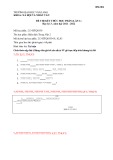
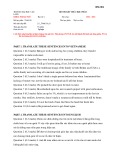
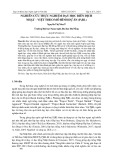
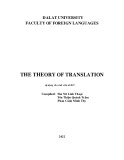
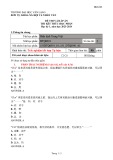










![Tài liệu Ngữ pháp HSK 3 [chuẩn nhất/ đầy đủ/ chi tiết]](https://cdn.tailieu.vn/images/document/thumbnail/2025/20251108/yenlethingoc49@gmail.com/135x160/11711762589284.jpg)

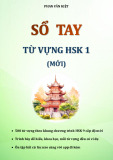
![Bài giảng Tiếng Trung Quốc du lịch khách sạn [Tập hợp]](https://cdn.tailieu.vn/images/document/thumbnail/2025/20251003/kimphuong1001/135x160/7291759464952.jpg)
![Đề thi Tiếng Trung 1 học kì 2 năm 2024-2025 có đáp án (Đề 2) - [Tuyển tập đề thi]](https://cdn.tailieu.vn/images/document/thumbnail/2025/20250920/kimphuong1001/135x160/76371758358928.jpg)

